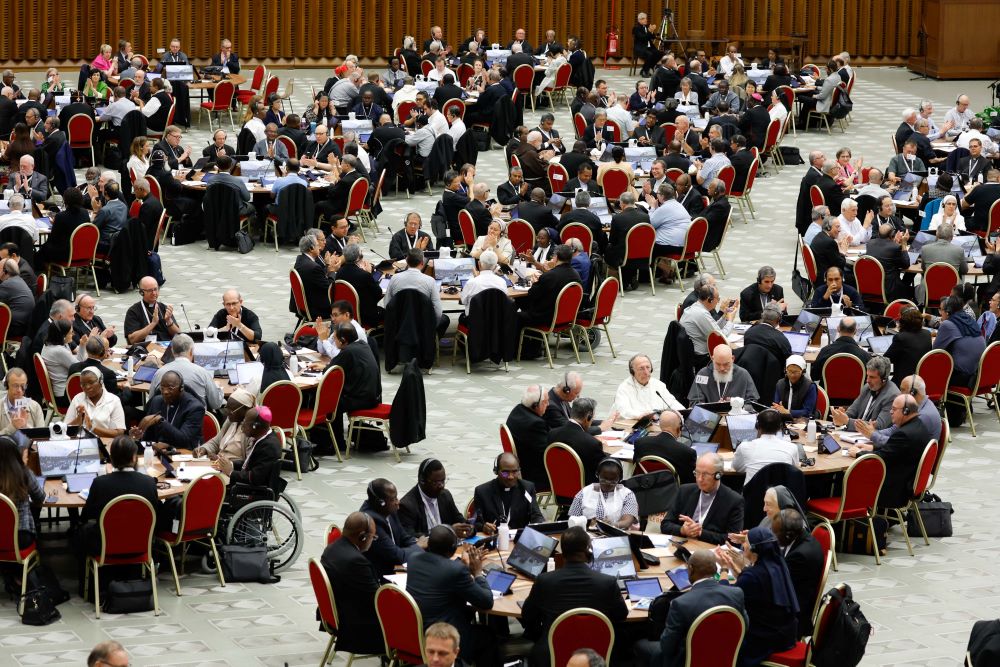
Members of the assembly of the Synod of Bishops start a working session in the Vatican's Paul VI Audience Hall Oct. 18. The second assembly of the Synod of Bishops on synodality is set for Oct. 2-27. (CNS/Lola Gomez)
In 1960 — two years before the start of the Second Vatican Council — Pope John XXIII established 10 preparatory commissions to lay the foundation of what would become a landmark event opening up the church to the modern world.
Among the major outcomes of the 1962-1965 council was the establishment of the Synod of Bishops, meant to promote greater collegiality between bishops and the pope. And under the Francis papacy, the synod has evolved dramatically, including for the first time ever in 2023, the participation of lay people who have a right to vote on the assembly's final document.
"This new type of synod with lay people is clearly a novelty, an experiment," said Villanova University theologian Massimo Faggioli. Part of that experimentation has meant the synod process is evolving in real time, as some organizers have noted.
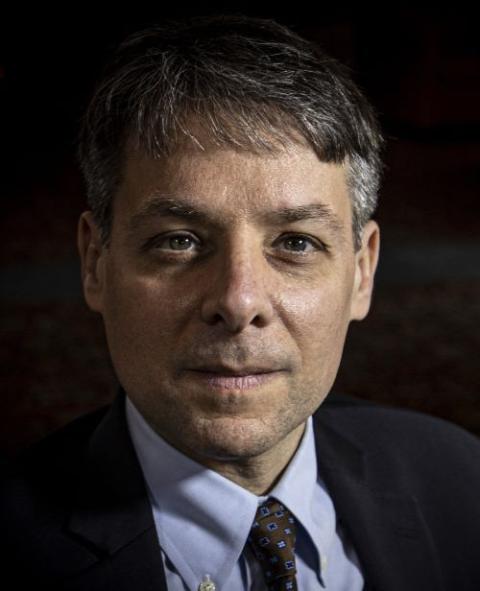
Massimo Faggioli is professor of historical theology at Villanova University. (CNS/Chaz Muth)
Most recently, following last October's first assembly of the synod on synodality, Pope Francis decided to establish working groups to study some of the most controversial issues that have emerged in the synod so far — and declared that the groups will remain in effect beyond the synod's final assembly in October 2024.
"I'm not shocked that it's happening now," Faggioli told NCR, noting that prior to Vatican II working groups were established and adjusted once the council got underway.
According to Faggioli, the new working groups are "an important acknowledgement that a different kind of work is needed." But he, and other theologians, also caution that many open questions remain.
Controlling the conversation?
Among the issues that the 10 study groups will address are how bishops are selected, seminary formation and the role of women in the church — some of the most discussed and divisive issues that surfaced at the synod on synodality in October 2023.
In announcing the groups, the head of the synod secretariat, Cardinal Mario Grech, said that the new structures would help to deepen theological reflection. They also would allow the respective Vatican dicasteries whose work is affected by certain topics to become more collaborative with one another, he said.
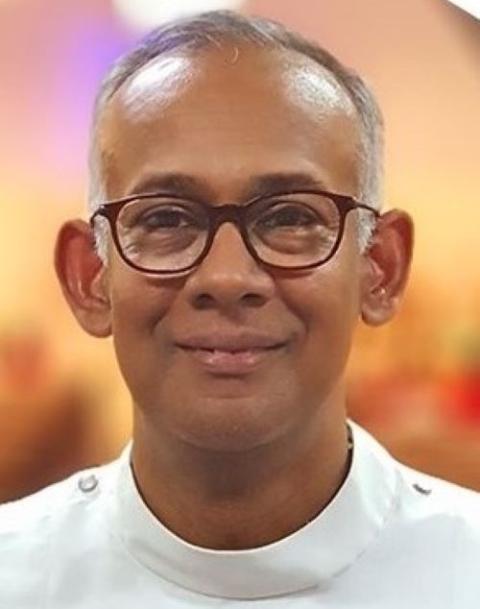
Fr. Clarence Devadass is director of the Catholic Research Centre in Kuala Lumpur, Malaysia, and one of the Synod of Bishops on synodality's Asian delegates. (Courtesy of Clarence Devadass)
Fr. Clarence Devadass, director of the Catholic Research Centre in Kuala Lumpur, Malaysia, and one of the synod's Asian delegates, told NCR he believes the study groups will help provide a stronger biblical and theological basis for many of those issues.
"This was kind of missing in the first session," he said.
Devadass said he doesn't believe that the study groups are an effort to begin to control the conversation or rein in debate, but rather "to take another step to be able to deepen the conversation."
Arnaud Join-Lambert, a theologian at the Catholic University of Louvain in Belgium and a member of the synod's methodology commission, said that the creation of study groups came as a surprise, but could be perceived as a response to the observation of many that the 2023 assembly overlooked the expertise of theologians.
But he also warned of another dimension that could be seen as more problematic.
"It could be a method of excluding properly theological questions from the synodal discussion" when it reconvenes, he said.
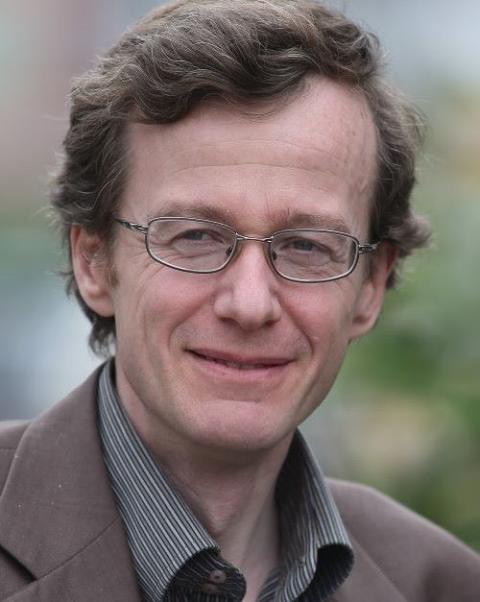
Arnaud Join-Lambert is a theologian at the Catholic University of Louvain in Belgium and a member of the Synod of Bishops on synodality's methodology commission. (Courtesy of Arnaud Join-Lambert)
Faggioli concurred that the decision to "provide more theological meat" is a "positive sign," but he said that the number of commissions and the membership — meant to include the Vatican's synod office, theological experts, members of the Roman curia, canon lawyers and the International Theological Commission — leads to a "very complex architecture" that makes it difficult to assess.
While NCR has confirmed that a number of the commissions have been formed and met, the membership of the commissions has not been made public. A spokesperson for the Vatican's synod office did not respond to a request for comment on whether this will remain the case.
How will the study groups affect October's assembly?
During the monthlong 2023 synod assembly, there was intense debate over the role of women's ministry, sexual ethics and the role of the laity, among the many issues that were raised throughout the month.
With the creation of the study groups — that will report to the synod in October 2024 but will continue until June 2025 — it remains unclear what to expect when synodal delegates reconvene in Rome this fall and what will be the agenda of the second assembly.
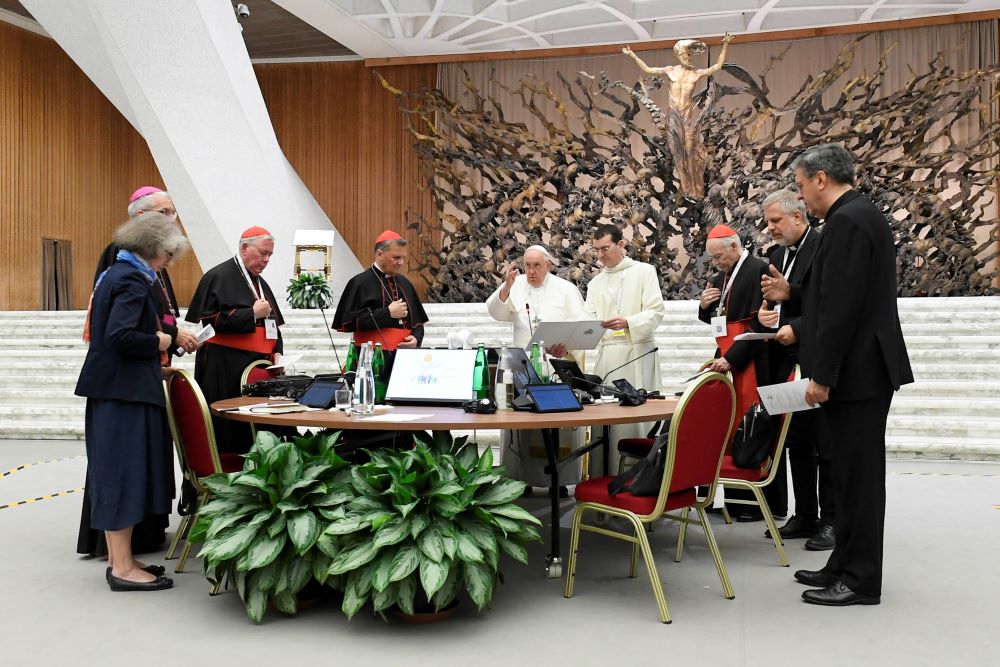
Pope Francis gives his blessing at the conclusion of the assembly of the Synod of Bishops' last working session Oct. 28, 2023, in the Paul VI Hall at the Vatican. (CNS/Vatican Media)
"The great success of the synodal process so far is that it has succeeded in bringing together actors who no longer spoke much to each other, and in correlating theological reflection, magisterial discernment and the sensus fidei," said Join-Lambert, who remains unsure how the study groups will affect this dynamic.
Following the 2023 assembly, episcopal conferences and dioceses around the globe were asked to organize follow-up consultations that are due to the synod office by May 15, which will help form the basis of the instrumentem laboris, or working document, for the second assembly.
The creation of the study commissions, according to Faggioli, is a sign that Francis' "preference is to have the second session, and the synod on synodality in general, an exercise in the practice of synodality more than about theological discussion."
He said this is already taking effect, with parishes, dioceses and other Catholic groups utilizing synodal discernment in their own operations and decision-making.
"I think this is what Pope Francis is hoping for," Faggioli said. "A new energy."
But what will remain of the issues that surfaced from the grassroots during the three-year process that included listening sessions of millions of Catholics from around the world?
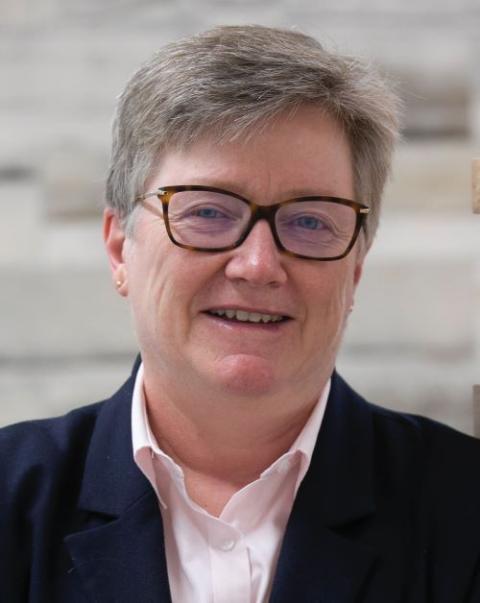
Catherine Clifford is a historian and theologian at St. Paul University in Ottawa and a Canadian lay delegate to the Synod of Bishops on synodality. (Courtesy of Catherine Clifford)
Historian and theologian Catherine Clifford, who is a professor at St. Paul University in Ottawa and a Canadian lay delegate to the synod, said that while the issues themselves are "not the central focus" of the upcoming assembly, "we're working toward a church where these questions can only be dealt with in a synodal manner."
For starters, she told NCR, this means "you cannot have a synodal church where there are not women participating at every level of the structures and decisional practices of the life of the church, no question."
The creation of the working groups, said Clifford, is a way to both preserve the issues as wide open questions, and to better focus the second synod assembly on the practice and process of synodality itself.
Clifford said that the study groups' work must be "open, transparent and accountable so that we have more insight into how these decisions are being made."
She noted that over the years the Vatican has often established study commissions for particular issues, only to not make their findings public.
In fact, the final synthesis document for the 2023 synod assembly specifically called for the results of earlier papal and theological commissions on the subject of women deacons to be presented for further consideration at the 2024 assembly.
"I have a responsibility as a delegate to say, 'look all these secret studies have gone on and we don't know what the upshot has been,' " said Clifford. "The way these issues have been dealt with over the last 50 years has undermined the confidence of the baptized faithful."
A synodal church, she said, necessarily entails that "before taking a decision, the magisterium does all of its homework and listens to everyone and takes decisions based on widely accepted data, that we make evidence based decisions or that we're responding to the real possible needs that people are experiencing."
Advertisement







